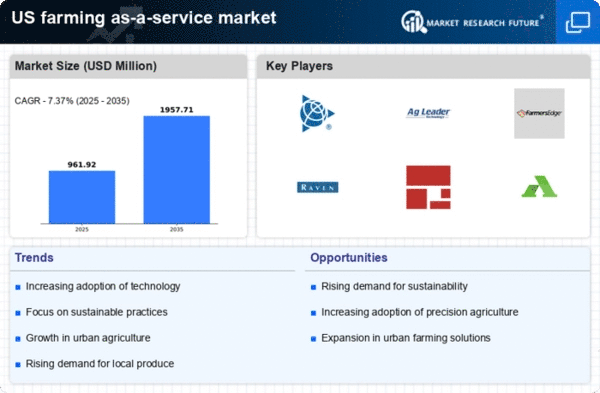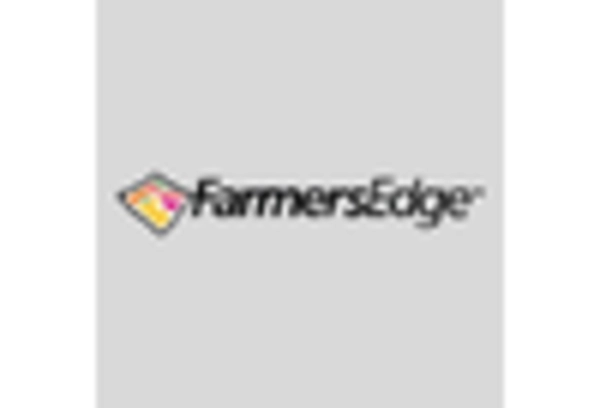Changing Consumer Preferences
Consumer preferences are shifting towards sustainable and locally sourced food, influencing the farming as-a-service market. As awareness of environmental issues grows, consumers are increasingly demanding transparency in food production. Farming as-a-service models can provide this transparency by utilizing technology to track and report on farming practices. This trend is likely to drive more farmers to adopt these services, as they seek to align with consumer values. By 2025, it is projected that the market for organic and sustainably produced food will reach $70 billion, further incentivizing farmers to engage with farming as-a-service solutions that meet these consumer demands.
Rising Demand for Food Security
Food security remains a pressing concern in the United States, driving growth in the farming as-a-service market. With a growing population projected to reach 400 million by 2050, the demand for efficient food production methods is paramount. Farming as-a-service offers scalable solutions that can adapt to varying agricultural needs, ensuring a steady supply of food. The market is expected to grow as more farmers adopt these services to meet the increasing demand for sustainable and reliable food sources. By 2025, the farming as-a-service market could see a growth rate of approximately 15% annually, as stakeholders recognize the importance of innovative farming solutions in addressing food security challenges.
Access to Capital and Investment
Access to capital is a critical driver for the farming as-a-service market. As traditional financing methods become more challenging, innovative funding solutions such as crowdfunding and venture capital are emerging. These financial avenues allow farmers to invest in farming as-a-service models without the burden of significant upfront costs. In 2025, it is anticipated that investment in agricultural technology will exceed $10 billion, with a substantial portion directed towards farming as-a-service initiatives. This influx of capital not only supports the development of new technologies but also encourages farmers to adopt these services, thereby expanding the market and enhancing agricultural productivity.
Government Support and Policy Initiatives
Government support plays a pivotal role in the growth of the farming as-a-service market. Various federal and state initiatives aim to promote sustainable agricultural practices and enhance food production efficiency. Programs that provide grants, subsidies, and tax incentives for adopting innovative farming technologies are becoming increasingly common. In 2025, it is expected that government funding for agricultural innovation will increase by 25%, further bolstering the farming as-a-service market. This support not only encourages farmers to transition to more efficient practices but also fosters a collaborative environment for the development of new agricultural solutions.
Technological Advancements in Agriculture
The farming as-a-service market is experiencing a surge due to rapid technological advancements. Innovations such as IoT devices, drones, and AI-driven analytics are transforming traditional farming practices. These technologies enable farmers to monitor crop health, optimize resource usage, and enhance yield. In 2025, it is estimated that the adoption of precision agriculture technologies could increase crop yields by up to 20%. This shift towards data-driven farming not only improves efficiency but also reduces operational costs, making farming as-a-service more appealing to a broader range of producers. As technology continues to evolve, the farming as-a-service market is likely to expand, attracting both small-scale and large-scale farmers seeking to leverage these advancements.
















